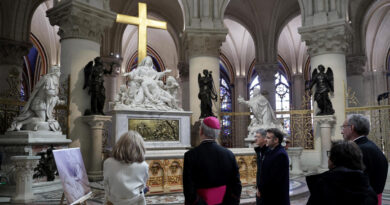Dazzling photo shows Perseid meteor shower’s “ancient fireworks” raining down on Stonehenge: “Window to the universe”
The Perseid meteor shower, one of the most highly anticipated celestial events every year, just took place — and at Stonehenge, one photographer managed to capture it in an image that he calls a “window to the universe.” The image, a composite of dozens taken over three hours the night of Aug. 9, shows the meteor shower and the Milky Way glowing over the U.K. historic site.
“I always like to remember them as ancient fireworks because they are,” astrophotographer Josh Dury, who captured the image, told CBS News. “The Perseus meteor shower is created by one of the oldest objects of our solar system, comets … I thought, ‘this is such a pertinent narrative through that sense of mystery and time.'”
Josh Dury
The image, a composition of 40 images taken over a three-hour period, was so dazzling that even NASA featured it as the Astronomy Picture of the Day on Aug. 12, an honor that Dury said “words can’t explain.”
“It’s insane,” he said. “… In a career as a landscape astrophotographer, it can’t get any bigger than that.”
Dury has been photographing the night sky since he was 7 years old after he watched the animated series “Biker Mice from Mars.”
“That just encapsulated my curiosity from such a young age for life on other worlds. And if you imagine that we’re lucky enough to have this composition for life here on Earth, as astronomers, when we’re observing galaxies, nebulas or star clusters, you can’t help but imagine thinking that there must be life somewhere out there in the universe,” he said. “And I do believe that’s what drives people forward, is that curiosity [of] what’s out there amongst the veil of darkness?”
Dury hopes his viral photograph will help today’s children feel as inspired as he was, and that it can help bring awareness to the importance of dark sky preserves and environmental conservation.
Artificial light is a major problem for catching these glimpses into space, he said. But it goes beyond disrupting what could be a mystical experience with the cosmos. Light pollution can also disrupt nocturnal wildlife, he said, and even people.
“Our bodies produce melatonin at night for our sleep patterns. And so if we don’t protect the night, we’re almost creating a ticking time bomb by not having the right condition,” he said. “…When we see dark sky places under threat more than ever before … the view of the night sky, it could well change within the period of our lifetime.”
Dark sky preserves, protected areas with minimal light pollution, are also under threat. Canada’s Jasper National Park, the second-largest dark sky preserve in the world, just suffered its worst wildfire in a century.
“It’s so important to protect our environment, culture and heritage,” he said, adding that it’s his mission to capture images such as this to provide inspiring “windows to the universe.” “… That’s another reason why I take photographs, is to inspire that next generation of 7-year-old youngsters like I was to look up at the night sky.”





